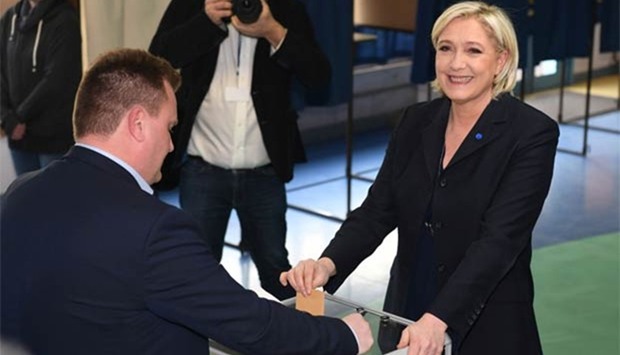French voters flocked to the polls on Sunday in the first round of a cliffhanger presidential election seen as vital for the future of the ailing European Union.
Far-right leader Marine Le Pen and centrist Emmanuel Macron are the favourites to progress to a run-off on May 7 but late gains by conservative Francois Fillon and left-winger Jean-Luc Melenchon blew the race wide open.Le Pen, the 48-year-old leader of the anti-immigration National Front (FN), hopes to capitalise on security fears that were catapulted to the fore of the campaign after the fatal shooting on Thursday of a policeman on Paris's Champs Elysees avenue claimed by the Islamic State group.
Voting was brisk, defying forecasts of a low turnout after a campaign dominated by scandals and a flight from the mainstream parties that have alternated in power for the past half century.
After nine hours of voting, turnout was 69.42%, one of the highest levels in 40 years. While down slightly on the same point in the 2012 election, an extra hour of voting in smaller towns was expected to take turnout to around 78-81%.
Riding a wave of disaffection with globalisation that carried Donald Trump to the White House and led Britain to vote for Brexit, Le Pen has vowed to dramatically reduce immigration, abandon the euro and hold a referendum on withdrawing from the EU.
While constitutional obstacles would make it difficult for her to uncouple France from the EU, a Le Pen victory could nonetheless be fatal for the EU, already weakened by Britain's shock vote to leave.
Macron, a 39-year-old pro-EU reformer, is seeking to become France's youngest ever president despite never having held elected office.
Tapping into anger with established parties, the former banker and economy minister formed his own movement, "En Marche" (On the Move), that he says is "neither to the left nor to the right."
But polls show the scandal-tainted Fillon, a former prime minister, and hard-left firebrand Melenchon also in with a fighting chance.
Le Pen cast her ballot in Henin-Beaumont, a former coal mining town in the party's northern heartland.
Macron voted in the chic northern seaside resort of Le Touquet with wife Brigitte, his former high school teacher who is 25 years his senior. Fillon and Melenchon both voted in Paris.
Nearly 47mn people are eligible to vote in the eurozone's second biggest economy.
Most polling stations will close at 1700 GMT, with those in major cities shutting at 1800 GMT. The first projections based on partial results are expected shortly afterwards.
With France still under the state of emergency imposed after the Paris attacks of November 2015 security was tight. Around 50,000 police and 7,000 soldiers were deployed to guard voters.
Thursday's shooting on the most famous street in Paris was the latest in a bloody series of terror attacks that have cost more than 230 lives since 2015.
Guy Belkechout, a 79-year-old pensioner who was voting in the working-class Parisian suburb of Trappes, said security was one of his main concerns.
In the aftermath of the Champs Elysees attack, Le Pen called for France to "immediately" restore controls at EU borders and deport all foreigners on a terror watchlist.
"Candidates who want fewer security measures, who want to reduce the police's powers, have not got my vote," Belkechout told AFP.
But Hajar Erhamani, a 39-year-old teaching assistant from the well-heeled Paris suburb of Sevres, said she was more worried about the economy and allegations about politicians lining their pockets with public money.
"You can't trust politicians these days. On the left and the right, they're stealing from us," she complained.
Many voters had spent weeks agonising over which candidate to choose, with many saying they opted for the contender they saw as best-placed to beat Le Pen in the run-off.
Closely watched around the world, the French campaign has been full of twists and turns.
A race that began with the surprise nomination of Fillon as right-wing candidate in November shifted into higher gear in December when unpopular Socialist President Francois Hollande decided not to seek re-election.
Hollande's five years in office have been dogged by a sluggish economy and the constant terror threat.
Fillon was the early frontrunner until his support waned after he was charged following accusations he gave his British-born wife a fictitious job as his parliamentary assistant for which she was paid nearly €700,000 of public money.
Though there are four main contenders in the election, a total of 11 candidates are taking part.
The candidate for the governing Socialists, Benoit Hamon, was a distant fifth going into Sunday's vote.

